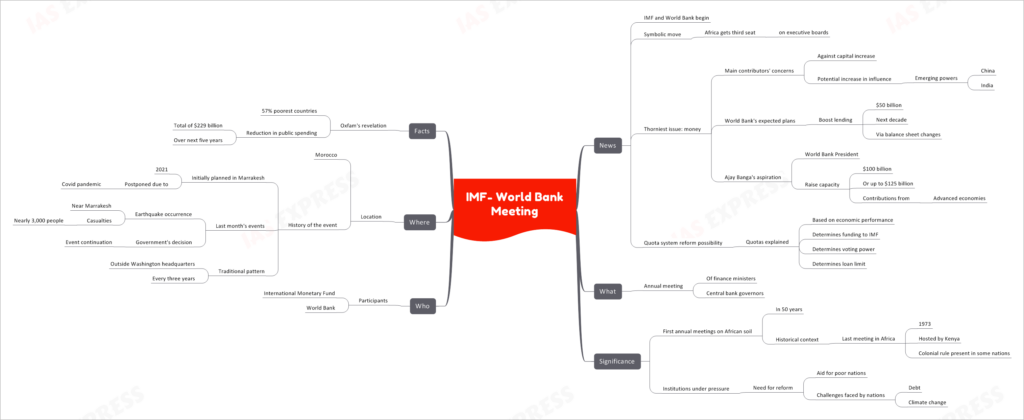IMF- World Bank Meeting

The recent news regarding the International Monetary Fund (IMF) and the World Bank’s annual meeting has sparked significant interest and debate among global stakeholders. This article provides an in-depth look at this important event, covering various aspects such as the meeting’s significance, participants, location, and key facts.
IMF and World Bank Begin
The IMF and World Bank have officially commenced their annual meeting, signifying a symbolic move towards addressing critical global financial issues. This year’s meeting has several noteworthy points to consider:
Africa Gets Third Seat on Executive Boards
One significant development is the allocation of a third seat for Africa on the executive boards of these international financial institutions. This move aims to provide African nations with a more prominent role in shaping economic policies on the global stage.
Thorniest Issue: Money
Money matters are at the forefront of discussions during this annual meeting, with various concerns and aspirations being raised:
Main Contributors’ Concerns
- Against Capital Increase: Some main contributors to the IMF and World Bank are wary of a proposed capital increase, fearing the potential economic burden it might impose.
- Potential Increase in Influence: Emerging powers like China and India aspire to have a greater say in the institutions’ decision-making processes, which could shift the global economic power balance.
World Bank’s Expected Plans
The World Bank has outlined its plans to boost lending over the next decade, with an ambitious target of providing $50 billion in financial support. This increase is expected to be facilitated through changes in the institution’s balance sheet.
Ajay Banga’s Aspiration
World Bank President Ajay Banga aims to raise the institution’s lending capacity significantly, potentially reaching up to $125 billion. To achieve this goal, contributions from advanced economies will play a crucial role.
Quota System Reform Possibility
Discussions about reforming the quota system within these financial institutions are on the table:
Quotas Explained
- Quotas are allocations of financial resources based on a country’s economic performance.
- They determine a nation’s funding allocation, voting power, and loan limit within the IMF and World Bank.
This topic of “IMF- World Bank Meeting” is important from the perspective of the UPSC IAS Examination, which falls under General Studies Portion.
What
Annual Meeting
The IMF-World Bank meeting is an annual gathering that brings together finance ministers and central bank governors from around the world. It serves as a platform for discussing crucial global financial issues.
Significance
This year’s annual meeting holds significant importance for several reasons:
First Annual Meetings on African Soil in 50 Years
This event marks the first time in half a century that the IMF and World Bank have held their annual meetings in Africa. This historical context is essential to understanding the significance of this year’s meeting:
Last Meeting in Africa
- The last such meeting in Africa took place in 1973 and was hosted by Kenya.
- At that time, many African nations were still under colonial rule.
Institutions Under Pressure
Both the IMF and World Bank face increasing pressure to reform their operations and policies, particularly in response to the following challenges faced by nations:
Aid for Poor Nations
- There is a growing need to provide more substantial aid to economically disadvantaged nations.
- The meeting aims to address how these institutions can better support such countries.
Challenges Faced by Nations
- Nations worldwide are grappling with issues such as debt and climate change.
- The meeting provides a forum for discussing strategies to address these challenges effectively.
Who
Participants
The key participants in this annual meeting are the International Monetary Fund (IMF) and the World Bank.
Where
Location
This year’s meeting is taking place in Morocco. The choice of location and the historical context of the event are noteworthy:
History of the Event
- Initially planned in Marrakesh in 2021, the event was postponed due to the Covid-19 pandemic.
- Recent events, including an earthquake near Marrakesh, prompted discussions on whether to continue with the event.
- The traditional pattern of holding the meeting outside the institutions’ Washington headquarters every three years has been disrupted.
Facts
One of the key facts associated with this year’s IMF-World Bank meeting is the revelation by Oxfam:
Oxfam’s Revelation
Oxfam has highlighted a critical issue concerning the world’s poorest countries:
- Oxfam reports that 57% of the world’s poorest countries are set to experience a reduction in public spending amounting to a total of $229 billion over the next five years.

